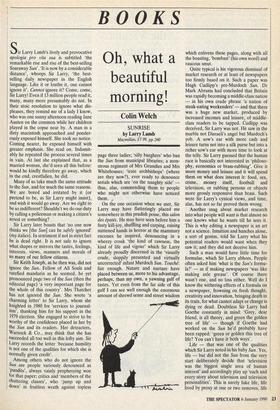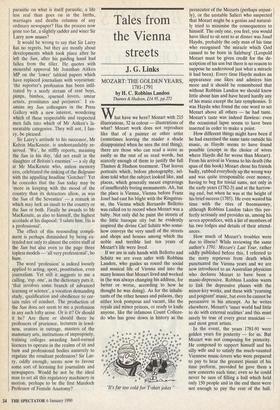BOOKS
Oh, what a beautiful morning!
Colin Welch
SUNRISE by Larry Lamb Macmillan, 17.99, pp.260 Sir Larry Lamb's lively and provocative apologia pro vita sua is subtitled 'the remarkable rise and rise of the best-selling Soaraway Sun'. 'It is now by a considerable distance', whoops Sir Larry, 'the best- selling daily newspaper in the English language. Like it or loathe it, one cannot ignore it'. Cannot ignore it? Come, come, Sir Larry! Even if 13 million people read it, many, many more presumably do not. In their stoic resolution to ignore what dis- pleases, they remind me of a lady I know, who was one sunny afternoon reading Jane Austen on the common while her children played in the copse near by. A man in a dirty macintosh approached and ponder- ously exposed himself. She took no notice. Coming nearer, he exposed himself with greater emphasis. She read on. Indomit- ably he repeated the process several times in vain. At last she explained that, as a married woman, she'd seen all this before: would he kindly therefore go away, which in the end, crestfallen, he did.
Many of us take much the same attitude to the Sun, and for much the same reasons. We are bored and irritated by it (or pretend to be, as Sir Larry might insist), and wish it would go away. Are we right to be so indifferent? Shouldn't we do our duty by calling a policeman or making a citizen's arrest or something?
Sir Larry later boasts that 'no one now thinks we [the Sun] can be safely ignored' (my italics). In sentiment if not in strict fact he is dead right. It is not safe to ignore what shapes or mirrors the tastes, feelings, interests, views, manners and morals of so many of our fellow citizens.
Sir Keith Joseph, as he then was, did not ignore the Sun. Fellow of All Souls and rarefied mandarin as he seemed, he yet pronounced page two of the Sun (then the editorial page) `a very important page for the whole of this country'. Mrs Thatcher has not ignored the Sun. She wrote 'a charming letter' to Sir Larry, whom she knighted in 1980 for 'services to journal- ism', thanking him for his support in the 1979 election. She engaged to strive to be worthy of the confidence placed in her by the Sun and its readers. Her detractors, Warnock & Co., may think that she has succeeded all too well in this lofty aim. Sir Larry records the letter 'because humility is not one of the qualities for which she is normally given credit'.
Among others who do not ignore the Sun are people variously denounced as pundits', always vainly prophesying woe for that paper; critics and 'members of the chattering classes', who 'jump up and down' in fruitless wrath against topless
page three ladies; 'silly burghers' who ban the Sun from municipal libraries; a mon- strous regiment of Mrs Grundies and Mrs Whitehouses; 'irate archbishops' (where are they now?), ever ready to denounce serials which are 'on the naughty side' thus, alas, commending them to people who might not otherwise have noticed them. ,,, On the one occasion when we met, Sir Larry may have flatteringly placed me somewhere in this prudish posse, this salon des epates. He may have seen before him a fusty kill-joy, shuffling and carping, raising mittened hands in horror at the mammary excesses he inspired, denouncing in a wheezy croak 'the kind of rawness, the 'kind of life and vigour' which Sir Larry already proudly discerned in the 'visually crude, sloppily presented and virtually uncorrected' infant Murdoch Sun. Touché: fair enough. Nature and nurture have placed between us, more to his advantage, perhaps, than my own, a yawning gulf of tastes. Yet even from the far side of this gulf I can see well enough the enormous amount of shrewd sense and street wisdom
which enlivens these pages, along with all the boasting, 'bombast' (his own word) and raucous smut.
Quite typical is his vigorous dismissal of market research or at least of newspapers too firmly based on it. Such a paper was Hugh Cudlipp's pre-Murdoch Sun. Dr Mark Abrams had concluded that Britain was rapidly becoming a middle-class nation — in his own crude phrase 'a nation of steak-eating weekenders' — and that there was a huge new market, produced by increased incomes and leisure, of middle- class ,readers to be tapped. Cudlipp was deceived, Sir Larry was not. He saw in the marble not Disraeli's angel but Murdoch's yob. A sow's ear with more cash and leisure turns not into a silk purse but into a richer sow's ear with more time to look at the telly. Sir Larry guessed that the human race is basically not interested in 'philoso- phy, economics or brass-rubbing'. Give it more money and leisure and it will spend them on what does interest it: food, sex, crime, money itself, football and television, or rubbing persons or objects more grossly responsive than brass. Such were Sir Larry's cynical views, and time, alas, has not so far proved them wrong.
Another snag about market research into what people will want is that almost no one knows what he wants till he sees it. This is why editing a newspaper is an art not a science. Intuition and hunches alone, a sort of genius, told Sir Larry what his potential readers would want when they saw it; and they did not deceive him.
Such a man would have little time for formulae, which Sir Larry abhors. People often asked him 'what is the Sun's formu- la?' — as if making newspapers 'was like making axle grease'. Of course there wasn't one, and no loss either. Well do I know the withering effects of a formula on a newspaper, frowning on fresh thought, creativity and innovation, bringing death in its train, for what cannot adapt or change is dying or dead. Doubtless Sir Larry had Goethe constantly in mind: 'Grey, dear friend, is all theory, and green the golden tree of life' — though if Goethe had worked on the Sun he'd probably have been rapped: 'green or golden this tree of life? You can't have it both ways'.
Life — that was one of the qualities which Sir Larry noted in his baby Sun. Yes, life — but did not the Sun from the very start deliberately decide that 'television was the biggest single area of human interest' and accordingly play up 'each and every story about television and television personalities'. This is surely fake life, life lived by proxy at one or two removes, life
parasitic on what is itself parasitic, a life less real than goes on in the births, marriages and deaths columns of any ordinary newspaper? Has the process now gone too far, a slightly sadder and wiser Sir Larry now muses?
It would be wrong to say that Sir Larry has no regrets, but they are mostly about developments which took place after he left the Sun, after his guiding hand had fallen from the tiller. He quotes with mournful approval Mr Jonathan Aitken MP on the 'lower' tabloid papers which have replaced journalism with voyeurism: `the reporter's profession has been infil- trated by a seedy stream of rent boys, pimps, bimbos, spurned lovers, smear artists, prostitutes and perjurers'. I ex- amine my Sun colleagues in the Press Gallery with a new interest, wondering which of these respectable and respected men falls into which of Mr Aitken's la- mentable categories. They will not, I fan- cy, be pleased.
Sir Larry's attitude to his successor, Mr Kelvin MacKenzie, is understandably re- served. 'We', he stiffly reports, meaning the Sun in his day, 'did not exult in the slaughter of Britain's enemies' — a sly dig at Mr MacKenzie who, unless memory errs, celebrated the sinking of the Belgrano with the appalling headline `Gotcher!' Yet he concedes that the Sun today may be `more in keeping with the mood of the country than its detractors allow, as was the Sun of the Seventies' — a remark in which may lurk an insult to the country or the Sun or both. Finally he awards to Mr MacKenzie, as also to himself, the highest accolade at his disposal: 'I salute him. He is a professional'.
The effect of this resounding compli- ment is perhaps diminished by being ex- tended not only to almost the entire staff of the Sun but also even to the page three
topless models 'all very professional', ho hum.
The word 'profession' is indeed loosely applied to acting, sport, prostitution, even journalism. Yet still it suggests to me a calling, 'esp. one', as the dictionary puts it, `that involves some branch of advanced learning or science', a vocation demanding study, qualification and obedience to cer- tain rules of conduct. The production of the Sun does not seem to me a profession in any such lofty sense. Or is it? Or should it be? Are there or should there be professors of prurience, lecturers in lewd- ness, orators in outrage, masters of the mammary arts, institutions of impropriety, training colleges awarding hard-earned licences to operate in the realms of tit and bum and professional bodies austerely to regulate the resultant profession? Sir Lar- ry, oddly enough, seems now to favour some sort of licensing for journalists and newspapers. Would he not be the ideal man to set all this regulatory machinery in motion, perhaps to be the first Murdoch Professor of Female Anatomy?











































 Previous page
Previous page